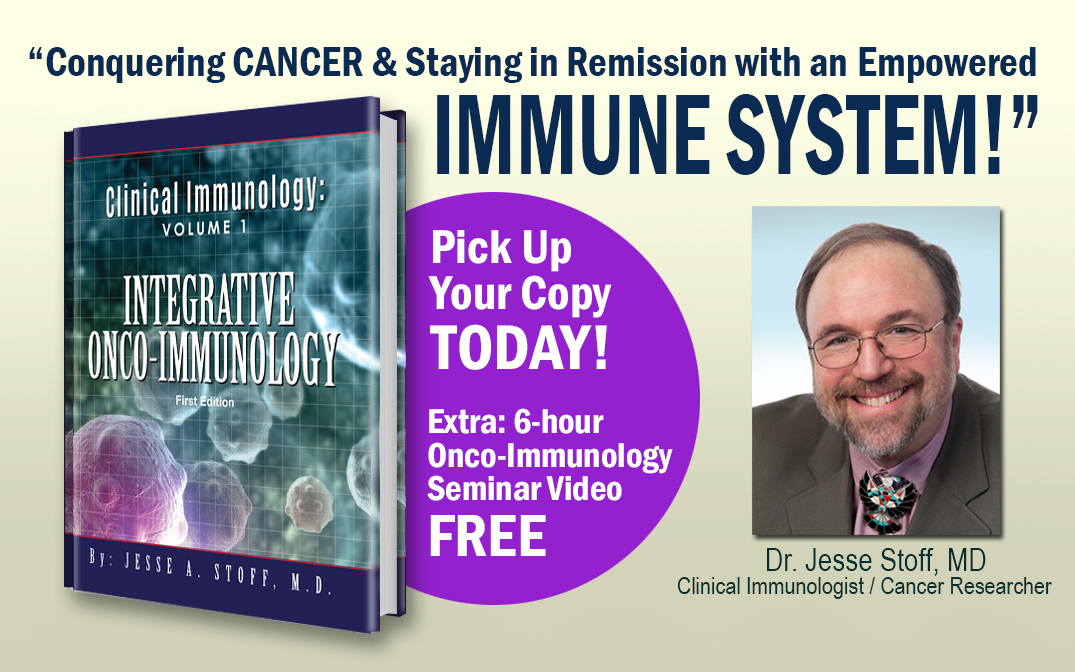
FOR IMMEDIATE RELEASE
MEDICAL EDITION: “INTEGRATIVE ONCO-IMMUNOLOGY: VOLUME 1”
By: Jesse A. Stoff, MD, HMD, FAAFP
October 11, 2017 is the official launch date of Volume 1 of Dr. Jesse Stoff's "Integrative Onco-Immunology" -the first text of its kind detailing the groundbreaking approach for treating cancer patients through the support of the immune system. This book series pays homage to the complexity of the human body and recognizes that no two cancer patients are alike, either in the underlying causes of the disease or in therapeutic treatment. THE STOFF PROTOCOL of treatment brilliantly gets to the root of the problem! Once the underlying cause of the disease has been identified and reversed, the patient stands a good chance of going into remission or at least finding dramatic improvement in quality and quantity of life... Dr. Stoff leads the way toward a new healing system that's more clinically effective, more humane, and more cost effective.
 |
| Click to purchase this at AMAZON.COM - enter coupon code BQK4XDLY for a one-time 40% discount |
THE PHILOSOPHY BEHIND THE STUDY OF
CLINICAL IMMUNOLOGY
All diseases, either acute and severe or chronic, have, to some degree, an element of immune dysfunction that is central to the disease process. The immune system is one of our primary and most critical systems, and helps to regulate our internal disease-fighting environment. It exerts its control by virtue of a multitude of circulating components, some of which include cytokines that are capable of acting at sites far removed from their points of origin. Its complexity rivals that of the nervous system, and in fact the similarities between the two are quite real. Cells of the immune system and the nervous system have many hormone receptor sites in common. It is no accident of nature that the thymus gland, the bone marrow, and the lymph nodes--all major centers of immune activity--are bundled in ropes of nerves.
The brain is known to transmit both electrical and chemical signals along nerves to stimulate, amplify and modify the immune responses. As the signals stream out from the brain, they often pass warnings from the immune centers flying in the opposite direction. The immune system is not merely a tool that is manipulated by the brain, but rather it is a sensory organ as well. It transmits chemical messages about bacteria, fungi, viruses, bits of dead tissue, and cancer cells. The wonder of it all is that such organization is possible, with the use of only a few distinct cell types whose members are widely scattered throughout the body.
Owing to the wide antigenic variability of cancer, as reflected in tumor genomic and proteomic profiling, individualized and targeted cancer therapy is a central goal of Immunotherapy. Immunotherapy is a rational means to this end because, the immune system can recognize a virtually limitless number of antigens secondary to the activity of the antigen presenting cells and the biology of the genetic recombination of the B and T lymphocytes. The immune system is exquisitely structured to distinguish self from non-self, and is able to vigorously attack non-self, cancer cells. The immuno-editing theory suggests that the immune system is able to recognize and eradicate the cancer cells that everyone seems to produce every day, and subclinical tumors. However, if the immune system is compromised then, at some point, equilibrium is reached and the tumor remains in situ, in a state of balance with but a partially efficacious response. Unfortunately, many tumors then escape from this equilibrium state, and cancer becomes clinically apparent. Our goal is to understand the mechanisms of anergy by which cancer is able to escape the immune system and to therapeutically intervene at critical points to promote anti-tumor immune responses through processes of immune reconstitution, stimulation and augmentation.
The immune system can be used as a therapeutic modality, especially as an anticancer agent, due to its flexibility and exquisite specificity. The reliance of this therapy on naturally occurring biological molecules to augment and guide the immune response means that of all the scientifically validated methods for treating cancer, immunotherapy may be the most natural and familiar to the patient. The immune system has the capability to spontaneously change its response as the cancer mutates; therein lies the promise of Onco-immunology as, potentially the most effective, treatment option.
CONTACT STOFF MEDICAL PUBLISHING AT: publisher@nycralliance.org or call: 631-920-5757